#Carla Guelfenbein
Quote
Claro que he tenido una que otra crisis existencial. Viene con el paquete de la modernidad.
Carla Guelfenbein, El revés del alma
#Carla Guelfenbein#El revés del alma#citas#frases#crisis existencial#modernidad#crisis#existencia#presente#moderno
173 notes
·
View notes
Text
El pasado retorna siempre en la forma de cosas pequeñas
1 note
·
View note
Photo
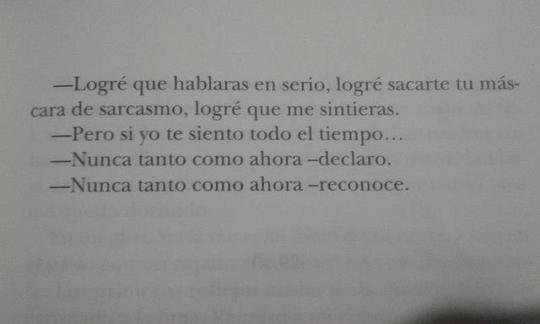
el resto es silencio - Carla Guelfenbein
(via val-blue)
#citas de amor#citas de libros#frases de libros#frase de libro#libro#el resto es silencio#cita#frases amor#frases en español#cita en español#cita en tumblr#carla guelfenbein
4 notes
·
View notes
Quote
Elle comprit que ce n'était ni la mémoire, ni l'amour, ni même la haine qui vous rendent libre, mais l'oubli.
Carla Guelfenbein, Nager nues
#carla guelfenbein#nager nues#lecture#mots#words#quote#quotes#citations#citation#bookworm#bookaddict
939 notes
·
View notes
Photo

Un jeune homme rassemble tous ses matériaux pour construire un pont qui le mène jusqu’à la lune, ou à un palais, ou à un temple sur la terre, mais à la longue l’homme mûr finit par construire tout juste un cabanon. Thoreau
Quelque part sur cette planète, quelqu’un était responsable de ta mort. Cette certitude grandit au fil des jours, des semaines, des mois, et fouetta si bien ma conscience qu’elle en devint insupportable. Mais qui ? Pourquoi ? l’idée ne m’avait jamais effleuré que la réponse était si proche qu’à force de la retourner dans tous les sens je me retrouverais face à moi-même.
Dès le premier instant, j’avais vu qu’elle possédait ce petit quelque chose qui me faisait défaut, et sans en avoir conscience j’avais rêvé de me l’approprier. Il est dans tes romans. Ce destin caché qui réunit les personnes et qui se met en branle à notre insu.
Tout au long de sa vie, Vera s’entoura d’énigmes et dans les rares interviews qu’elle accorda, elle se retrancha toujours derrière la même réponse : “Mon grand mystère est que je n’ai pas de mystère.
A distance, le Chili était devenu le lieu où tous les trous noirs de mon existence se rempliraient de lumière. La Terre promise, le paradis perdu.
C’était un de ces moments qui à première vue semblent sans consistance, où deux êtres échangent quelques mots, et qui cependant peuvent modifier le destin de ceux qui le vivent.
Etre à distance (Contigo en la distancia) Carla Guelfenbein
0 notes
Photo
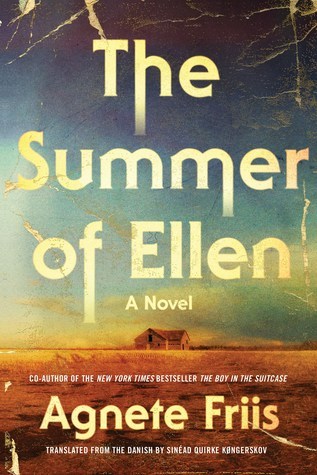
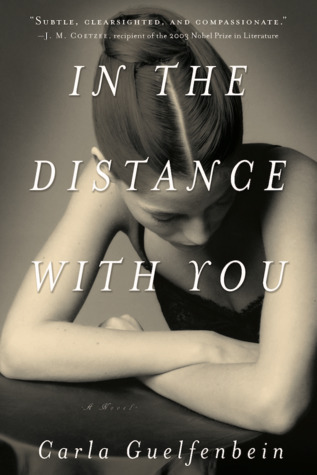


International Fiction (translated to English)
The Summer of Ellen by Agnete Friis, Sinead Quirke Kongerskov (Translator)
Agnete Friis returns with a lyrical, suspenseful new standalone set in rural Denmark that moves between the present and the summer of 1978, exploring obsession, toxic masculinity and the tricks we play on our own memory.
Jacob, a middle-aged architect living in Copenhagen, is in the throes of a bitter divorce and the resulting alcoholic binge when he receives an unexpected call from his great-uncle Anton, who is in his nineties and still lives with his brother Anders on their rural Jutland farm—a place Jacob hasn’t visited since the summer of 1978.
Anton asks Jacob to answer the question that has haunted them both for decades: What happened to Ellen?
To find out, Jacob must revisit the farm and confront what took place that summer—one defined by his teenage obsession with Ellen, a beautiful young hippie from the local commune who came to stay with Anton and Anders, and the unsolved disappearance of Jacob’s best friend’s sister. What he finds is that none of these events were what they seemed, though they have affected the course of his entire life.
In the Distance with You by Carla Guelfenbein, John Cullen (translator)
This Chilean literary thriller tells the story of three lives intertwined with that of an enigmatic author, whose character is inspired by the groundbreaking Brazilian writer Clarice Lispector.
Vera Sigall, now eighty years old, has lived a mysterious, ascetic life far from the limelight of literary circles. This powerful character has a profound effect on those around her--Daniel, an architect and her neighbor and friend, unhappy in his marriage and career; Emilia, a Franco-Chilean student who travels to Santiago to write a thesis on the elusive Vera; and Horacio, an acclaimed poet with whom Vera had a tumultuous, passionate affair in her youth.
As Daniel, Emilia, and Horacio tell their stories, they reconstruct Vera's past, and search for their own identities. Spanning from modern-day Chile to the 1950s, 60s, and through the years of the Pinochet dictatorship, With You at a Distance reveals successive mysteries anddiscoveries like a set of Russian nesting dolls.
Death Is Hard Work by Khaled Khalifa, خالد خليفة, Leri Price (Translation), Hümeyra Rızvanoğlu Süzen (Translator)
A dogged, absurd quest through the nightmare of the Syrian civil war
Khaled Khalifa's Death Is Hard Work is the new novel from the greatest chronicler of Syria's ongoing and catastrophic civil war: a tale of three ordinary people facing down the stuff of nightmares armed with little more than simple determination.
Abdel Latif, an old man from the Aleppo region, dies peacefully in a hospital bed in Damascus. His final wish, conveyed to his youngest son, Bolbol, is to be buried in the family plot in their ancestral village of Anabiya. Though Abdel was hardly an ideal father, and though Bolbol is estranged from his siblings, this conscientious son persuades his older brother Hussein and his sister Fatima to accompany him and the body to Anabiya, which is--after all--only a two-hour drive from Damascus.
There's only one problem: Their country is a war zone.
With the landscape of their childhood now a labyrinth of competing armies whose actions are at once arbitrary and lethal, the siblings' decision to set aside their differences and honor their father's request quickly balloons from a minor commitment into an epic and life-threatening quest. Syria, however, is no longer a place for heroes, and the decisions the family must make along the way--as they find themselves captured and recaptured, interrogated, imprisoned, and bombed--will prove to have enormous consequences for all of them.
Broken Stars: Contemporary Chinese Science Fiction in Translation by Ken Liu(Editor, Translator), Xia Jia, Zhang Ran, Tang Fei, Han Song, Cheng Jingbo, Baoshu, Hao Jingfang, Fei Dao, Liu Cixin, Anna Wu, Ma Boyong, Gu Shi, Regina Kanyu Wang, Chen Qiufan, Mingwei Song
Broken Stars, edited by multi award-winning writer Ken Liu - translator of the bestselling and Hugo Award-winning novel The Three Body Problem by acclaimed Chinese author Cixin Liu - is his second thought-provoking anthology of Chinese short speculative fiction. Following Invisible Planets, Liu has now assembled the most comprehensive collection yet available in the English language, sure to thrill and gratify readers developing a taste and excitement for Chinese SF.
Some of the included authors are already familiar to readers in the West (Liu Cixin and Hao Jingfang, both Hugo winners); some are publishing in English for the first time. Because of the growing interest in newer SFF from China, virtually every story here was first published in Chinese in the 2010s.
The stories span the range from short-shorts to novellas, and evoke every hue on the emotional spectrum. Besides stories firmly entrenched in subgenres familiar to Western SFF readers such as hard SF, cyberpunk, science fantasy, and space opera, the anthology also includes stories that showcase deeper ties to Chinese culture: alternate Chinese history, chuanyue time travel, satire with historical and contemporary allusions that are likely unknown to the average Western reader. While the anthology makes no claim or attempt to be "representative" or "comprehensive," it demonstrates the vibrancy and diversity of science fiction being written in China at this moment.
In addition, three essays at the end of the book explore the history of Chinese science fiction publishing, the state of contemporary Chinese fandom, and how the growing interest in science fiction in China has impacted writers who had long labored in obscurity.
#fiction#international fiction#international literature#world literature#english translation#reading recommendations#book recs#recommended reading#library#public library#tbr#booklr#booklist
9 notes
·
View notes
Text
Identity Crisis
Not sure how long I’m going to keep this blog up for, but why not?
Lately, I’ve been seeing a lot of #darkacademia, #cottagecore, and everything in between of wishing what our young lives could be like. There’s a lot of quoting “The Dead Poet’s Society,” fawning over Miss Honey from “Matilda,” reblogged images of crumbled castles, dusty libraries, and aesthetics to match. Turtle necks, tweed jackets, thrifted boots, round or tortoise-shell glasses.
And I love this. Who doesn’t wish our lives could center around romanticizing soft, accidental hand touches, or cups of warm tea over bad candle-lighting? Wishing our lives were not what they are now.
But, always the but, I also can’t fully engross myself in this because a part of my identity is still missing. All this is so white, so euro-centric, so anglo. Pero, donde esta lo de mas?
I want to be that Latina running through the halls of Oxfordian-like halls, reading the novels of Latin American female writers, like Carla Guelfenbein, Isabel Allende, Rigoberta Menchu, and Gloria Anzaldúa. I want to wear, and already do, the turtleneck and silver-rimmed glasses without feeling like I’m denying some other part of myself.
I watched “Little Women” and “Call Me By Your Name” recently (you can thank my friend who’s a bit on the Timothée Chalamet-train), and yes, the movies were good. And that’s just it. They were simply good. But I can’t help but feel dried out, like there’s nothing in these kinds of movies or stories, these two and all others that fit in this genre, that touch my soul like they’re meant to.
On my end, I plan on spending some summer time reading over more Latin-American written books. Here’s where I’m starting, a few I’m already familiar with: https://www.buzzfeed.com/shylawatson/latina-authors-books-hispanic-heritage-month-2019?utm_source=dynamic&utm_campaign=bfsharecopy. Hopefully, by the end of the summer, I can feel like I have a spirit again.
That’s on my end, anyway. And I wonder, are there more like me? Are there others who dream of being surrounded by books and flowers, yearning and flowers, but also hear the music of cicadas in palos verdes, wear their light clothes with bold colors and playful embroidery, and fall in love by turquoise fountains under the blanket of a warm night?
That’s what I want to see more of. Do you?
#latina#aestheitcs#dark acadamia aesthetic#cottagecore#timothee chalamet#books and libraries#academia aesthetic#always a but#summertime#spirit#identity crisis
5 notes
·
View notes
Text
No hay nada más destructivo para el amor que el desprecio a uno mismo.
Carla Guelfenbein, contigo en la distancia
#lo leí en algún lugar#citas en español#lo leí por ahí#textos en español#frases en español#frases#frases de libros#libros#frases tristes#lecturas#madrugada#desprecio#amor
13 notes
·
View notes
Photo

Nager nues, Carla Guelfenbein
Une petite anecdote pour commencer : c’est le deuxième roman édité par Actes Sud que je lis en quelques jours et il se trouve que le titre de celui-ci, Nager nues, colle parfaitement à la couverture du précédent, La fille des Louganis, où l’on voyait justement une fille nue en train de nager... Curieuse coïncidence. Ceci dit, les deux livres n’ont rien en commun, c’est juste une remarque que je me suis faite comme ça, en passant - et qui ne présente qu’un intérêt limité, je vous l’accorde ;)
Carla Guelfenbein nous livre ici un joli roman dont j’ai vraiment apprécié la lecture même si à ce jour (soit quatre jours et un livre plus tard) je n’ai pas grand chose à en dire.
Nager nues, c’est l’histoire d’une relation triangulaire : une fille, son père, l’amie de la fille. Cette dernière devient la maîtresse du père (pas de syndrome Lolita, non, Morgana a une petite vingtaine d’années quand tout commence). La relation est d’abord secrète mais, évidemment, ce genre de truc ne reste jamais caché bien longtemps (surtout que Morgana tombe enceinte, bonjour la discrétion). Bref, Sophie, la fille, boude et quitte le pays. Raconté comme ça, ça casse pas trois pattes à un canard n’est-ce pas ?
Néanmoins, le roman est captivant pour deux raisons : tout d’abord par l’évocation en toile du fond du Chili, ce pays alors à l’aube de l’une des pages les plus sombres de son histoire, le coup d’état du 11 septembre 1973. Le gouvernement du président (démocratiquement élu) Salvador Allende est renversé par un coup d'État militaire dirigé par le général Augusto Pinochet. La dictature ainsi mise en place va durer seize ans (quand même ouais !) et ce régime sera marqué par de multiples violations des droits de l’homme (plus de 3 200 morts et “disparus”, autour de 38 000 personnes torturées, plusieurs centaines de milliers d'exilés). C’est dans ce contexte que Carla Guelfenbein place son histoire, Diego, le père donc, est un homme avec des idéaux qui, en tant que proche du Président Allende, se retrouve du jour au lendemain en grand danger car qualifié de “dissident communiste”. Morgana est entraînée avec lui dans cette vie clandestine où il faut se cacher sans cesse, porter un autre nom, cette vie qui n’en est pas une, juste une fuite perpétuelle où on ne peut plus se fier à rien ni à personne. Et forcément ça se termine mal.
La seconde raison qui fait que j’ai aimé ce livre, c’est l’écriture délicate et tout en nuances de Carla Guelfenbein qui a su décrire avec finesse le sentiment amoureux et toute sa palette de nuances, l’amitié, la sensualité, la tendresse, mais aussi la jalousie, la rage et finalement la beauté et la simplicité du pardon. Elle mêle avec bonheur les destins individuels de ses personnages et les soubresauts de l’Histoire en nous rappelant que tout cela est inextricablement lié, qu’on le veuille ou non...
Quatrième de couverture : Toute à sa joie de présenter son amie Morgana à un père qu’elle vénère, Sophie est loin d’imaginer la triangulation funeste qu’elle s’apprête à provoquer. Rapidement, ces deux-là partagent bien plus que leur affection pour elle – comme va en attester l’enfant à naître.
Anéantie par la trahison, Sophie coupe les ponts et rejoint sa mère en France alors même qu’en cet été 1973, à Santiago du Chili, le monde s’écroule. Mort d’Allende, état de siège : Morgana et Diego entrent dans la clandestinité et connaissent des moments d’intimité furtifs sous le fracas des hélicoptères et des détonations. Mais dans un guet-apens, tous deux sont tués. Conduite en Espagne, leur enfant est sauvée in extremis de l’enfer.
Le 11 septembre 2001, les images d’un avion qui perfore la surface verticale et sombre d’une tour à New York réactivent chez Sophie les souvenirs du palais du gouvernement en flammes vingt-huit ans plus tôt, à Santiago. Elle comprend alors qu’il n’est d’oubli sans pardon, ni pardon sans vérité. Et elle se lance à la recherche de cette enfant abhorrée – sa demi soeur – qui, seule à présent, peut lui donner le goût de vivre.
Dans une prose orageuse et sensuelle où les spasmes des corps répondent aux convulsions de l’Histoire, Carla Guelfenbein affronte le Chili de sa jeunesse et des grands rêves brisés.
#carla guelfenbein#nager nues#lire#livre#lecture#bouquin#read#reading#book#books#bookblogger#booklover#bookworm
0 notes
Text

Contigo a la distancia.- Carla Guelfenbein ✍🏻
0 notes
Photo
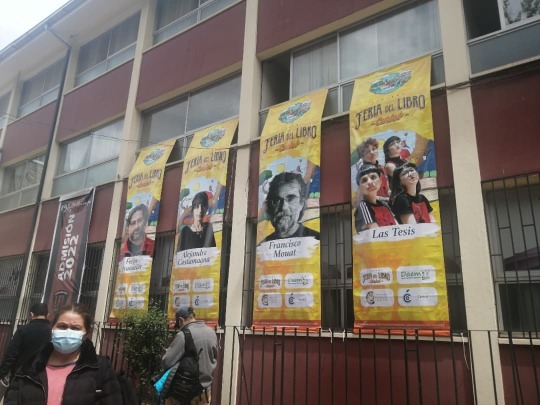
Feria del libre Felic en Curicó Fecha de inicio de funcionamiento desde el día 08 al 12 de Noviembre de 2021 en el Liceo Fernando Lazcano. Está actividad cultural se realizará en frente del portal del Liceo mencionado, específicamente en la plaza de Curicó entre Estado y Yungay. #CURICÓ Entre algunos nombres llamativos están Las Tesis, Carla Guelfenbein, Alberto Mayol, Norma Fernández, entre otros. @eltelescopio.cl @radio_pulso (en Curicó, Vll Region Del Maule - Chile) https://www.instagram.com/p/CVTBgdml-OT/?utm_medium=tumblr
0 notes
Quote
Las palabras son a veces como flechas. Van y vienen, hiriendo y matando, al igual que las guerras
El resto es silencio
val-blue
#citas de libros#frase de libros#citas español#citas en español#frases#libros#el resto es silencio#carla guelfenbein#citas en tumblr#cosas que escribo#cosas de tumblr#cosas de la vida#citas de desamor
8 notes
·
View notes
Quote
Elle s'est éloignée du monde pour l'aimer.
Carla Guelfenbein, Nager nues
#carla guelfenbein#nager nues#lecture#mots#words#quote#quotes#citations#citation#bookworm#bookaddict
192 notes
·
View notes
Link
“The Farm,” by Héctor Abad, “In the Distance With You,” by Carla Guelfenbein, and “The Linden Tree,” by César Aira, range from rural Colombia to cosmopolitan Santiago and Peronist Argentina.
1 note
·
View note
Photo
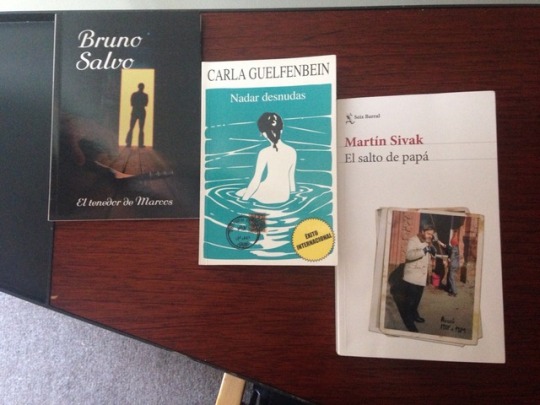
Els llibres del viatge D'esquerra a dreta: L'uruguaià Bruno Salvo. 'El tenedor de Marcos'. Distreta, juga amb la llengua, per agafar el deix de la parla de la zona. La xilena Carla Guelfenbein. 'Nadar desnudas'. Cursi però interessant perquè parla dels anys de l'Allende. L'argentí i jueu Martín Sivak. 'El salto de papá'. Autobiogràfica. La història del pare de l'autor i la història de l'Argentina en paral·lel. La millor? La darrera, sense cap dubte tot i que m'he perdut en els detalls de l'ambientació política. Molt personal i emotiva sense sentimentalismes.
4 notes
·
View notes